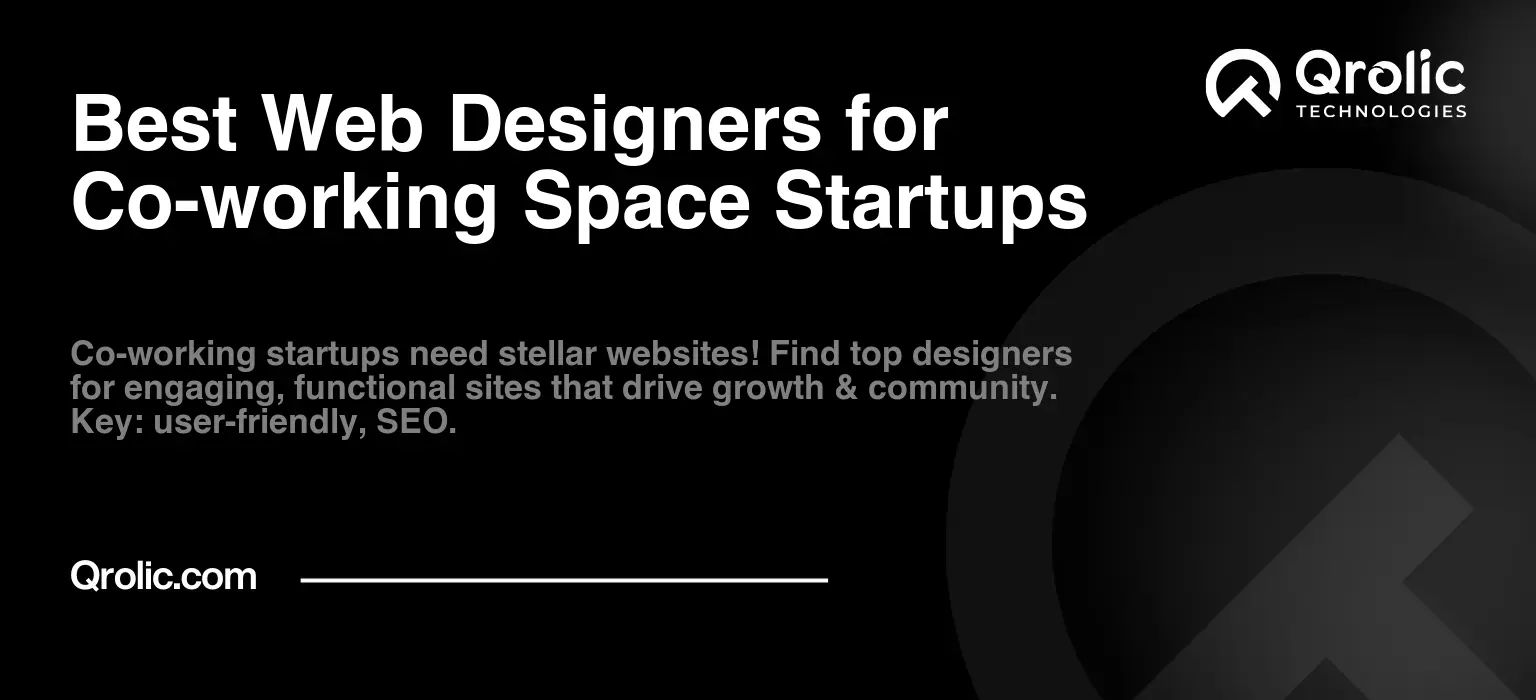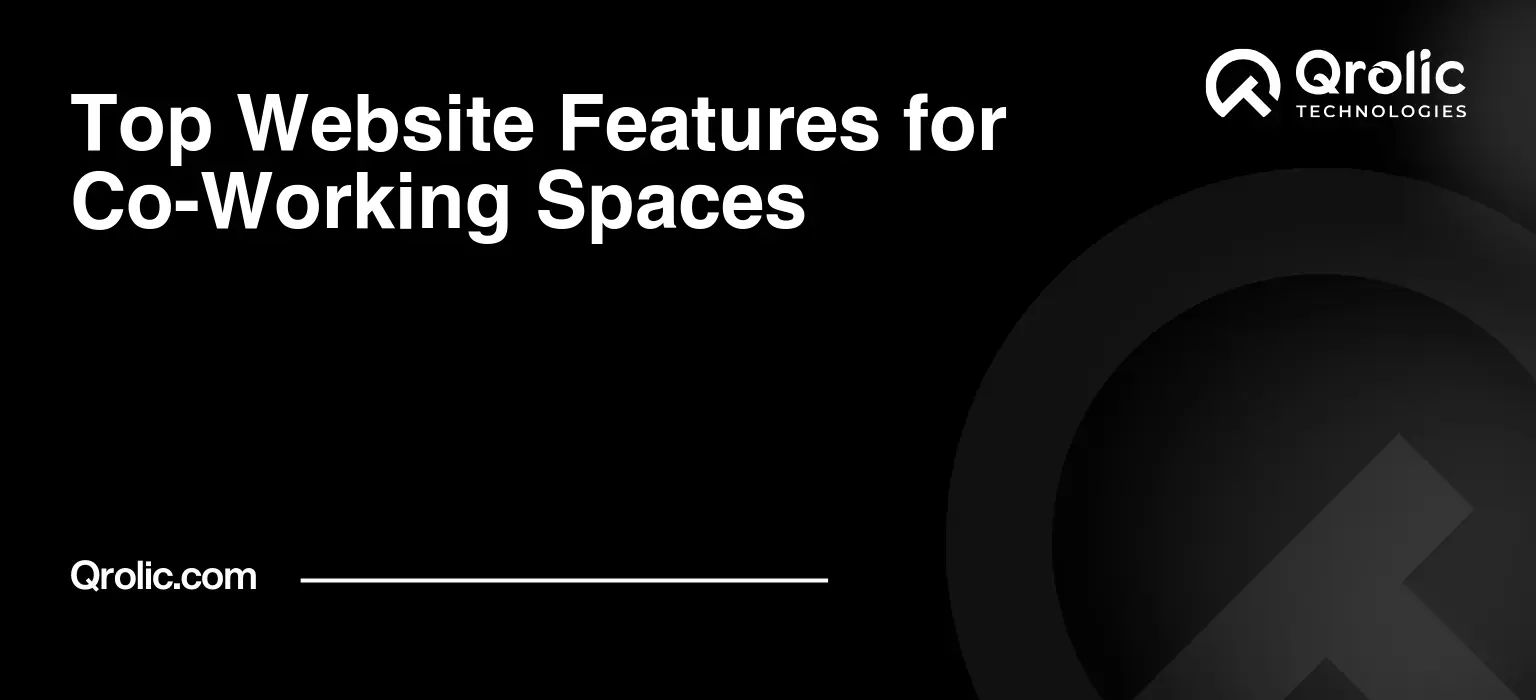Quick Summary:
- Your website is vital for attracting members and growth.
- Design for user-friendliness, stunning visuals, and clear details.
- Choose a web designer who understands co-working spaces.
- Use SEO strategies to ensure members find your website.
Table of Contents
- Why Your Co-working Space Startup Needs a Killer Website
- The Website as the First Touchpoint
- The Direct Impact on Your Bottom Line
- A Poor Website Can Cost You
- What Makes a Great Website for a Co-working Space?
- User-Friendly Navigation
- Stunning Visuals
- Clear Value Proposition
- Pricing Transparency
- Strong Call-to-Actions (CTAs)
- Community Focus
- Essential Functionality
- How to Choose the Right Web Designer for Your Co-working Space
- Define Your Needs and Goals
- Research Potential Web Designers
- Ask the Right Questions
- Evaluate Their Understanding of Co-working Spaces
- Trust Your Gut Feeling
- Examples of Great Co-working Space Website Designs
- Example 1: Focus on Community (e.g., The Wing)
- Example 2: Focus on Minimalism and Functionality (e.g., WeWork)
- Example 3: Focus on Luxury (e.g., NeueHouse)
- Example 4: Focus on a Niche Market (e.g., a co-working space for creatives)
- SEO Strategies for Your Co-working Space Website
- Keyword Research
- On-Page Optimization
- Off-Page Optimization
- Content Marketing
- Technical SEO
- Local SEO
- Why Choose Qrolic Technologies for Your Co-working Space Website?
- Expertise in the Co-working Industry
- Custom Design and Development
- Focus on User Experience
- Strong SEO and Digital Marketing Knowledge
- Ongoing Support and Maintenance
- Our Commitment to Quality
- Let’s Build Your Perfect Website Together
Why Your Co-working Space Startup Needs a Killer Website
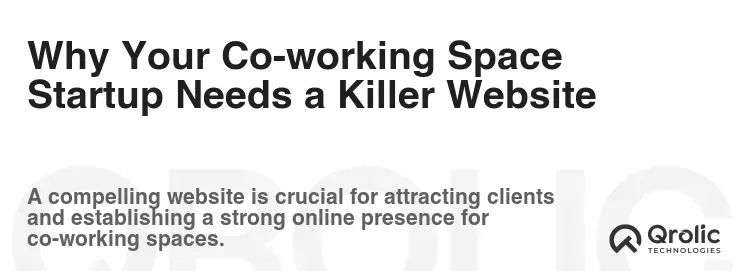
The co-working space industry is booming. Flexible work arrangements are no longer a trend; they’re a staple of modern work life. If you’re a co-working space startup, you’re stepping into a competitive market. A crucial element to set you apart? An outstanding website. Think of your website as your digital storefront, your 24/7 salesperson, and the first impression many potential members will have of your brand.
The Website as the First Touchpoint
In today’s digital-first world, people turn to the internet first when looking for anything, including co-working spaces. A compelling website acts as the initial point of contact for potential members. It’s where they’ll:
- Discover Your Space: They’ll see your facilities, learn about your vibe, and get a feel for your community.
- Evaluate Suitability: They’ll assess if your co-working space aligns with their needs, budget, and preferences.
- Form a First Impression: A clunky, outdated website can instantly turn potential members away. A sleek, user-friendly one will draw them in.
- Decide to Engage: They’ll be prompted to book a tour, sign up for a free trial, or ask questions, if your site is well-designed and engaging.
The Direct Impact on Your Bottom Line
Your website isn’t just a pretty face; it directly impacts your business’s success. Here’s how:
- Lead Generation: A well-optimized website can attract organic traffic, converting casual browsers into paying members.
- Increased Conversions: Clear call-to-actions, easy navigation, and persuasive copy will help you convert website visits into leads and bookings.
- Brand Building: Your website is an extension of your brand, conveying your unique personality and value proposition.
- Operational Efficiency: Online booking systems, FAQs, and member portals can reduce administrative tasks, allowing you to focus on providing excellent service.
A Poor Website Can Cost You
On the flip side, a poorly designed website can harm your startup:
- Lost Leads: A confusing or frustrating website will drive potential members to your competitors.
- Negative Brand Perception: An outdated site will make your space seem unprofessional and out of touch.
- Missed Opportunities: If your website doesn’t showcase your best features, you’re missing chances to sell.
- Higher Costs: Lack of automation and online processes can lead to increased administrative overhead.
Key takeaway: A professional and engaging website is an investment, not an expense, for your co-working space startup. It is the backbone of your online presence and drives your growth.
What Makes a Great Website for a Co-working Space?
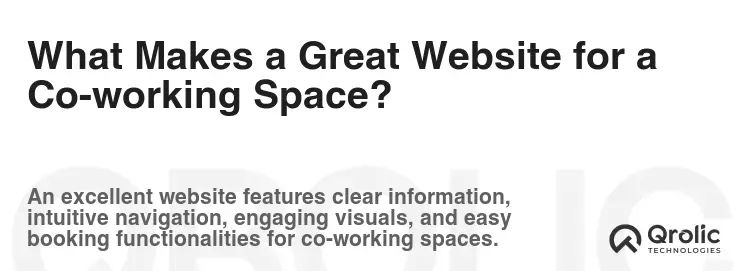
Not all websites are created equal, and what works for a e-commerce store might not work for a co-working space. Here are some key elements that make a co-working space website stand out:
User-Friendly Navigation
Your website should be easy to navigate. Users should be able to find what they are looking for intuitively.
- Clear Menu Structure: Simple, well-labeled menus help users quickly find what they need, whether that’s pricing, amenities, or booking a tour.
- Search Functionality: If you have a lot of content, a search bar makes it easier for users to locate specific information.
- Mobile-Friendly Design: Your website should be fully responsive and look great on all devices, from smartphones to desktops. Many potential members might be searching while on the go.
Stunning Visuals
Co-working spaces thrive on aesthetics. Use high-quality images and videos to showcase your space.
- Professional Photography: Capture the unique vibe of your co-working space with high-resolution photos. Showcase your workspaces, meeting rooms, communal areas, and any unique features.
- Virtual Tours: Allow potential members to experience your space remotely with engaging virtual tours.
- Video Content: Introduce your team, give a space overview, and show off any special events or community activities with video.
Clear Value Proposition
Communicate the unique benefits of your co-working space clearly and concisely.
- Highlight Key Features: Clearly articulate your services and amenities, such as high-speed internet, meeting rooms, 24/7 access, printing facilities, and social events.
- Emphasize Your Community: Showcase the community aspect of your co-working space. Feature testimonials and photos of members interacting.
- Focus on the ‘Why’: Explain what makes your co-working space different and better. What problems does your space solve?
Pricing Transparency
Be upfront about your pricing structure.
- Clear Pricing Plans: Display your membership plans clearly, including any options for different levels or add-ons.
- Easy-to-Understand Language: Avoid jargon and use language that is clear and concise.
- No Hidden Fees: Be transparent about all costs to avoid surprises for your members.
Strong Call-to-Actions (CTAs)
Encourage visitors to take the next step.
- Prominent Buttons: Place clear and compelling call-to-action buttons, such as “Book a Tour,” “Start a Free Trial,” or “Join Now,” strategically throughout your site.
- Action-Oriented Language: Use compelling action words in your CTAs to encourage clicks.
- Make it Easy: Ensure the next step, whether booking a tour or requesting more information, is as smooth and seamless as possible.
Community Focus
Co-working is all about the community. Reflect this in your website.
- Member Testimonials: Share positive reviews and testimonials from your current members.
- Events and Activities: Promote upcoming social events, workshops, and networking opportunities.
- Blog or News Section: Keep your website updated with relevant content that resonates with your community.
Essential Functionality
Your website should have essential features that make it easy for visitors to engage with your space.
- Online Booking System: Allow users to easily book tours, day passes, or even book meeting rooms.
- Contact Form: Provide an easy way for potential members to reach out with questions.
- FAQs: Answer common questions about your space, pricing, and membership options.
- Member Portal (Optional): If applicable, offer a secure member portal for managing bookings and community engagement.
Key takeaway: A great website is not just about aesthetics, it’s about usability, functionality, and how well it connects with potential members on an emotional and practical level.
How to Choose the Right Web Designer for Your Co-working Space
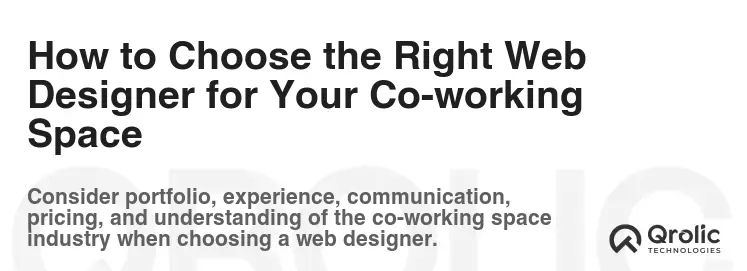
Now that you know what makes a great website, the next step is choosing the right web designer. It’s a crucial decision that can impact the success of your online presence. Here’s a step-by-step approach:
Define Your Needs and Goals
Before you even start looking, it’s essential to understand your requirements.
- Budget: Determine how much you can afford to invest in your website.
- Timeline: Set a realistic timeframe for the project.
- Specific Requirements: Do you need an online booking system? A membership portal? Identify any unique features you require.
- Desired Aesthetics: What kind of style do you envision? Minimalist? Modern? Rustic? Prepare examples of websites that you like.
- Content Strategy: Will you be creating content? Will you need help with content creation?
Research Potential Web Designers
Don’t settle for the first option you find. Take your time and do your research.
- Portfolios: Review the portfolios of different designers. Look for websites they have designed for businesses similar to yours.
- Testimonials and Reviews: Check online reviews and testimonials from previous clients to get an idea of their professionalism and quality of work.
- Specialization: Do they specialize in designing websites for co-working spaces or similar industries?
- Communication Style: Assess if their communication style is aligned with your needs. Do they respond promptly to your questions?
- Technology Expertise: Do they understand the latest web design trends and technologies? Are they proficient in design tools such as Figma, Photoshop etc and development languages such as PHP, JavaScript etc.
Ask the Right Questions
When you narrow down your options, it’s time to ask some crucial questions.
- Experience: How many years of experience do they have in web design?
- Process: What is their design and development process?
- SEO Knowledge: Do they have a solid understanding of SEO best practices?
- Maintenance and Support: Do they offer ongoing website maintenance and support?
- Cost Structure: What is their pricing model? Is it fixed or hourly? Are there any additional costs?
- Communication: How often will they provide updates? What are the main points of contact?
Evaluate Their Understanding of Co-working Spaces
Make sure they truly get what makes your business special.
- Industry Knowledge: Do they understand the unique challenges and opportunities faced by co-working space startups?
- Target Audience: Do they know how to design a website that appeals to your target audience?
- Community Focus: Can they reflect your unique community ethos on your website?
Trust Your Gut Feeling
Finally, choose a web designer you trust and feel comfortable working with.
- Collaboration: Do you feel they are a collaborator who values your input?
- Vision: Can they see your vision and understand your goals for your business?
- Enthusiasm: Are they passionate about your project and excited to work with you?
Key takeaway: Selecting the right web designer is just as important as creating the right website. Look beyond pricing and focus on finding a partner who understands your needs, goals, and the co-working space industry.
Examples of Great Co-working Space Website Designs
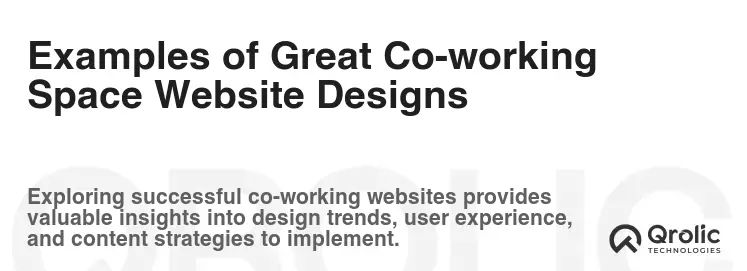
Let’s look at a few co-working spaces that have nailed their web design, with a view to inspiring you:
Example 1: Focus on Community (e.g., The Wing)
- Visuals: High-quality photos showcasing the community interaction, member activities, and events.
- Community Focus: Member profiles, testimonials, and a strong emphasis on networking opportunities.
- Blog: Regularly updated blog with content relevant to the community.
- Membership Details: Transparent details on membership plans and benefits.
- Overall Impression: Welcoming, vibrant, and community-driven.
Example 2: Focus on Minimalism and Functionality (e.g., WeWork)
- Visuals: Clean, modern, high-quality photography of the space without too much clutter.
- Navigation: Simple and intuitive navigation, with focus on user experience.
- Locations: Detailed information about locations with virtual tours and amenities.
- Clear CTAs: Prominent “Book a Tour” or “Find a Space” buttons.
- Overall Impression: Professional, sleek, and functional.
Example 3: Focus on Luxury (e.g., NeueHouse)
- Visuals: High-end photography, beautiful lighting and stylish design.
- Exclusivity: Emphasis on premium services and amenities.
- Unique Features: Highlighting unique elements of the space, such as art installations or premium services.
- Brand Story: Well-written content that reflects the brand’s unique story.
- Overall Impression: Sophisticated, luxurious, and exclusive.
Example 4: Focus on a Niche Market (e.g., a co-working space for creatives)
- Visuals: Artistic, visually rich images that speak to the creativity of their member base.
- Specialization: Highlighting workshops, tools, and amenities for creatives.
- Community Stories: Showcasing member’s work and celebrating their success.
- Events Focus: Promoting design workshops, showcases, and relevant events.
- Overall Impression: Inspiring, creative, and collaborative.
Key takeaway: These examples illustrate that there isn’t one-size-fits-all approach to web design. The best websites align with the co-working space’s brand, target audience, and value proposition.
SEO Strategies for Your Co-working Space Website
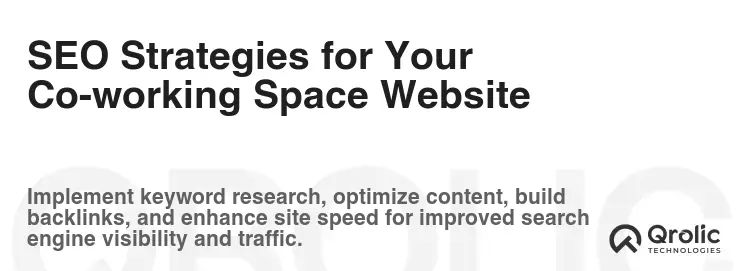
Having a beautiful website is just the first step. You need to make sure people can actually find it. Search Engine Optimization (SEO) is crucial for driving organic traffic to your website.
Keyword Research
Identify the keywords people are using when searching for co-working spaces.
- Location-Based Keywords: e.g., “co-working space [city name]”, “[city name] shared office space”
- Niche Keywords: e.g., “co-working space for startups”, “creative co-working space”
- Benefit-Driven Keywords: e.g., “flexible office space”, “meeting room rental”
- Long-Tail Keywords: e.g., “co-working space with 24/7 access in [city name]”
Use keyword research tools like Google Keyword Planner, SEMrush, or Ahrefs to find relevant keywords.
On-Page Optimization
Optimize your website content and structure for search engines.
- Title Tags: Use your primary keywords in the title tags of your website pages.
- Meta Descriptions: Craft engaging meta descriptions that entice users to click on your search results.
- Header Tags: Use header tags (H1, H2, H3, etc.) to structure your content and include keywords naturally.
- Content Quality: Create high-quality, informative content that is relevant to your audience and optimized for your target keywords.
- Image Alt Text: Use descriptive alt text for images to help search engines understand what the images are about.
- Internal Linking: Link to other relevant pages within your website.
Off-Page Optimization
Build your website’s authority by getting links from other websites.
- Local Citations: List your business on local directories, such as Google My Business, Yelp, and industry-specific sites.
- Guest Blogging: Write guest posts for industry-related websites and publications.
- Link Building: Reach out to other businesses and websites to request backlinks.
- Social Media: Promote your content on social media to drive traffic to your website.
Content Marketing
Create valuable content to attract and engage your target audience.
- Blog: Regularly publish articles related to co-working, remote work, productivity, and community events.
- Case Studies: Showcase success stories from your members.
- Infographics: Create visually appealing infographics with useful information.
- Videos: Create engaging video content that showcases your space, community, and events.
Technical SEO
Ensure your website is technically sound and optimized for search engines.
- Website Speed: Optimize your website to load quickly on all devices.
- Mobile-Friendliness: Ensure your website is fully responsive and mobile-friendly.
- XML Sitemap: Submit an XML sitemap to Google to make it easy for search engines to crawl your website.
- HTTPS Security: Use HTTPS to ensure your website is secure.
Local SEO
Focus on optimizing your website for local search results.
- Google My Business: Claim and optimize your Google My Business listing.
- Local Keywords: Include location-based keywords in your website content and meta tags.
- Local Citations: List your business on relevant local directories.
- Reviews: Encourage your members to leave reviews on your Google My Business page and other relevant platforms.
Key takeaway: SEO is a long-term strategy. Be patient, consistent, and adapt to changes in search engine algorithms. It’s a key component in your website’s success and will help you drive more organic traffic.
Why Choose Qrolic Technologies for Your Co-working Space Website?
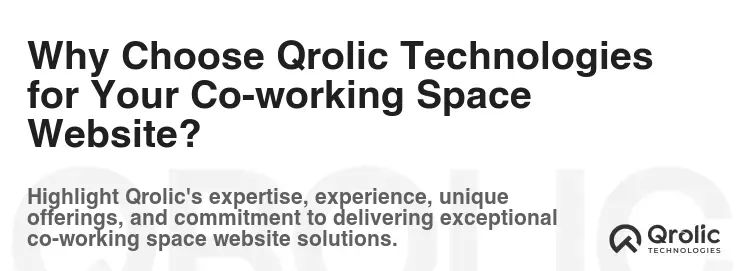
If you’re looking for a web design partner that understands your needs, Qrolic Technologies stands out from the crowd. We are not just web designers, we are your technology partner committed to the growth of your business.
Expertise in the Co-working Industry
Qrolic Technologies has experience working with co-working spaces and understands the unique needs of this industry. We understand that your website is your online hub, and we ensure it reflects the dynamic and collaborative nature of your community.
Custom Design and Development
We don’t believe in one-size-fits-all solutions. We work closely with you to create a custom website that reflects your brand identity and meets your specific business goals. Our team uses latest technologies and design principles to build websites that are visually appealing, functional, and engaging.
Focus on User Experience
We prioritize user experience in all our website designs. We make sure that your website is easy to navigate, fast-loading, and mobile-friendly, providing a smooth experience for your potential members on all devices.
Strong SEO and Digital Marketing Knowledge
We not only design visually stunning websites, but we also build them with SEO in mind. We integrate all the necessary technical and on-page SEO aspects to make sure your website is easily found in search engines. We are your long-term partner in growth, we assist in long-term digital marketing strategies too.
Ongoing Support and Maintenance
Our work doesn’t end after the website launch. We provide ongoing support and maintenance to ensure your website stays updated, secure, and optimized for maximum performance. We are committed to long-term partnership with you to ensure your continued success.
Our Commitment to Quality
At Qrolic Technologies, we are committed to delivering high-quality solutions that meet our clients’ needs and exceed their expectations. We take pride in our work, and we’re excited to work with you on your co-working space’s journey.
Let’s Build Your Perfect Website Together
Your website is an essential investment for your co-working space startup. Let us be your trusted partner in bringing your vision to life. Contact Qrolic Technologies today at https://qrolic.com/ to discuss your project and start building your perfect website.
Key takeaway: By partnering with Qrolic Technologies, you’re not just getting a website, you’re getting a technology partner committed to the long-term success of your business.
